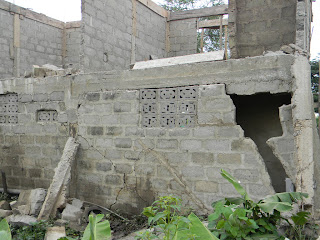By: Ryan Millward
A recent research study has shown that the quality of sandcrete blocks in the Central Region of Ghana do not achieve the minimum required compressive strength of 2.8N/mm2
The study, carried out by Emmanuel Bamfo-Agyei of Cape Coast Polytechnic, shown some sandcrete block to be as little as 30% in strength of the compressive strength. He made the revelation at the West Africa Built Research Conference that was held in Accra where more than ninety papers were presented by academicians from West Africa and South Africa.
This is of obvious importance to residents who live in houses as well as the factories people work in; with these structures being made of sandcrete blocks, there are numerous dangers that can come to fruition - a simple seismic shock could see buildings collapse and lives end.
This is of obvious importance to residents who live in houses as well as the factories people work in; with these structures being made of sandcrete blocks, there are numerous dangers that can come to fruition - a simple seismic shock could see buildings collapse and lives end.
This research show sandcrete block producers to be in violation of government regulations; The National Building Regulation LI 1630:1996 Clause 29(1) and (2) noted that any material used in the erection of building shall be of suitable nature and quality for the purposes and conditions in which they are to be used. Section (2) stated that the use of any material should conform to an approved Ghana Standard Code of Practice.
.A block producer said they mould the block with strength that is 2.8N/mm2 for inspection by the Ghana Standard Board but do not produce that same strength for the public. The reason why they do this is because the price to put every block up to a safe standard is too much. This shows sandcrete block producers are putting lives at risk in place of a heftier profit. But responsibility must also fall to the Engineering Department of Standard Board who are there to monitor and make sure the building materials are safe for the public; the research shown that according to the records of the standard board more than 70% of the producers in Ghana do not meet the standard however no company has been closed down due to achieving standard.
The research worked on the principle that for sandcrete blocks to be safe to the public, a strength of 2.8N/mm2 density is required; however, some of the inspections of sandcrete block factories around Cape Coast shown results on inspection to be between 30 and 40% of the quality required; At Abura Asebu Kwamankess District (AAK) the block factory recorded 0.91N/mm2 instead of 2.8N/mm2; Cape Coast metropolis two blocks were tested from the same factory and recorded different strength 1.13N/mm2 and 1.37N/mm2 respectively representing less than 50% of the standard crushing strength; at Komenda Edina Eguafo Abrem (KEEA) 1.29N/mm2 and 1.12N/mm2 were recorded and the standard crushing strength of 2.8N/mm2 was not achieved; Mfantsiman municipality recorded the least crushing strength of sandcrete block 0.20N/mm2 and 0.29N/mm2 respectively representing 7%.
All in all these results show the quality of bricks being used to be of poor quality which again, highlights the risks involved in the continual shoddy production of these building companies; some of the supervisors of the sandcrete block factories that the research was conducted indicated that they lack equipment to determine the strength of the blocks produced, instead they measure the strength based on visual test or how long the block can absorb the water determines the strength. This is not the way to be acting when lives are realistically, put in the building companies hands.
The study by Emmanuel Bamfo-Agyei will draw memories back to recent structural collapses in Ghana -precisely Kumasi and Accra in 2007 where the quality of brick was below standard causing the buildings to collapse and injuries to ensue. Recently there was a structural failure of an uncompleted building closer to the total filling station in Cape Coast. The fact that it is the most used in the Central Region means the production of the sandcrete blocks should be of high standard to ensure safety. If this study has shown us one thing besides the quality of the building materials to be below standard, it is that apart from this, there must be action by the Government to ensure that the Engineering Department of Standard Board perform their duty of ensuring all the building materialstr in Ghana are up to a safe standard. At the end of the day, building collapses cost lives and with the slightest tremor, many lives could be taken by these poor quality blocks.
 |
| One of the sandcrete block being tested |




No comments:
Post a Comment